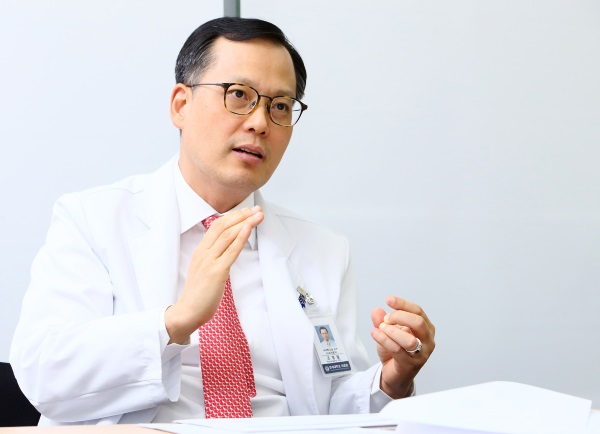‘Opdivo shows optimal effect regardless of PD-L1 in largest Asian study’
In curing esophageal cancer, there has been no treatment option other than chemotherapy for a long time. However, immunotherapies have recently shown better efficacy than existing therapies, opening a new chapter in the treatment history of esophageal cancer.
After Keytruda (ingredient: pembrolizumab) became the first immunotherapy to treat PD-L1 (programmed death-ligand 1) positive advanced squamous cell esophageal cancer, Opdivo (nivolumab) recently demonstrated therapeutic effect, regardless of PD-L1 expression, in a massive, phase-3 ATTRACTION-3 trial, and drew the industry’s attention.
Professor Cho Byoung-chul of the Medical Oncology Division at Severance Hospital presented the results of the ATTRACTION-3 study at the Annual European Society for Medical Oncology (ESMO) 2019 Congress in Barcelona, Spain, in September.
Korea Biomedical Review met with Cho to learn the study results in detail and the clinical implications of Opdivo in the advanced squamous cell esophageal cancer treatment.

Question: Esophageal cancer is not well known compared to other cancer. Can you explain it?
Answer: Esophageal cancer occurs in the esophagus, which is connected to the stomach and passes foods. According to the latest statistics, about 2,500 new cases were reported in Korea in 2016. By the frequency of occurrence, it was the seventh-common carcinoma in the world in 2018. It does not occur as frequently as lung cancer and gastric cancer, but once it occurs, it is fatal.
Q: How have physicians treated esophageal cancer to date?
A: Esophageal cancer in stage 1 or 2 can be treated with radiation or surgery alone. In locally advanced stages, we can combine high intensity focused ultrasound (HIFU) with anticancer drugs after surgery, use a HIFU-radiation combo, or try postoperative chemotherapy. For patients who are unable or unwilling to undergo surgery, doctors usually treat them with chemotherapy and radiation simultaneously.
Advanced esophageal cancer is only cancer that had no therapy to improve survival in the first-line treatment. Because of the small number of patients, clinical studies have been scarce, and there was no basic data. So, doctors have mainly used “preferred regimen,” instead of a drug that improves survival. One example is the combination of fluoropyrimidine and cisplatin (5-FU-Cisplatin). However, the use of drugs developed more than 60 years ago means we have failed to conduct sufficient research. The combo treatment mentioned above has an average response rate of about 20 percent and a progression-free survival of approximately three months.
We can use docetaxel, paclitaxel, and irinotecan for the second-line treatment, but we cannot expect long-term survival. In advanced esophageal cancer, there is no proper medicine, and the average survival is only five to six months.
Q: You presented the outcome of the ATTRACTION-3 trial at ESMO 2019, right?
A: Yes. Through the ATTRACTION-3 study, Opdivo showed the first survival improvement compared to chemotherapy with or without PD-L1 expression in advanced squamous cell esophageal cancer. The trial was conducted in patients who were refractory or intolerant to previous fluoropyrimidine-based and platinum-based chemotherapy, among unresectable patients with advanced or recurrent squamous cell esophageal cancer. The phase-3 trial compared Opdivo with existing chemotherapy (docetaxel or paclitaxel). The primary endpoint was overall survival, and a total of 419 patients participated.
The main feature of the study is that it was the most extensive study on Asian patients. As mentioned earlier, esophageal cancer in Asia is quite different from that in the West. The study targeted patients with squamous cell esophageal cancer only, which occurs in Asia widely.
In this setting, Opdivo significantly extended overall survival with or without PD-L1 expression, compared to chemotherapy (10.9 months for Opdivo vs. 8.4 months for chemotherapy), and reduced the risk of death by 23 percent. Based on studies on more than 10 solid cancer, including lung cancer and bladder cancer, 20 percent of the Opdivo-treated group is expected to survive long-term, even in esophageal cancer.
Q: How can we improve treatment for local esophageal cancer patients?
A: In the esophageal cancer treatment, researchers are conducting studies to combine immunotherapies such as Opdivo with chemotherapy to increase the response rate. A phase-3 research is underway to evaluate the combination of Opdivo-chemotherapy and Opdivo-Yervoy, compared to chemotherapy alone, as the first-line treatment for advanced squamous cell esophageal cancer. People expect that there would be a significant improvement in survival in the immunotherapy-included group. Also, another study is being conducted to use immunotherapy-chemotherapy-radiation in a locally advanced stage where surgery is impossible.
As there is no authorized treatment for esophageal cancer, we need reimbursement for immunotherapies in treating advanced squamous cell esophageal cancer. As the number of patients is less than 1 percent of lung cancer patients, it will be surely reimbursable. Until the treatment gets reimbursable, I strongly recommend that patients should participate in a clinical trial that tests Opdivo or other immunotherapy.

